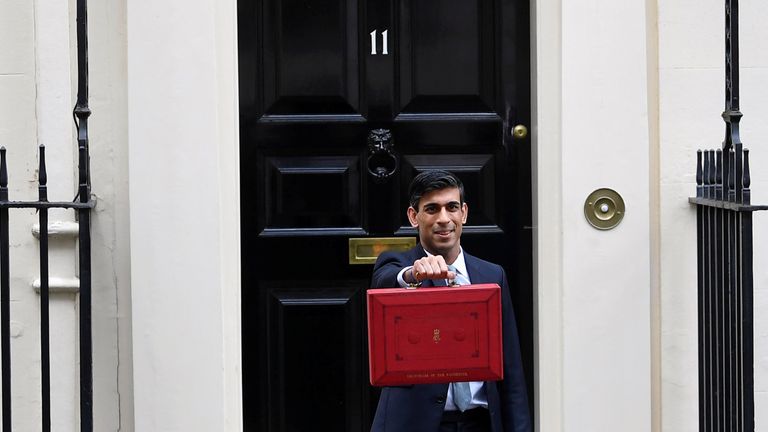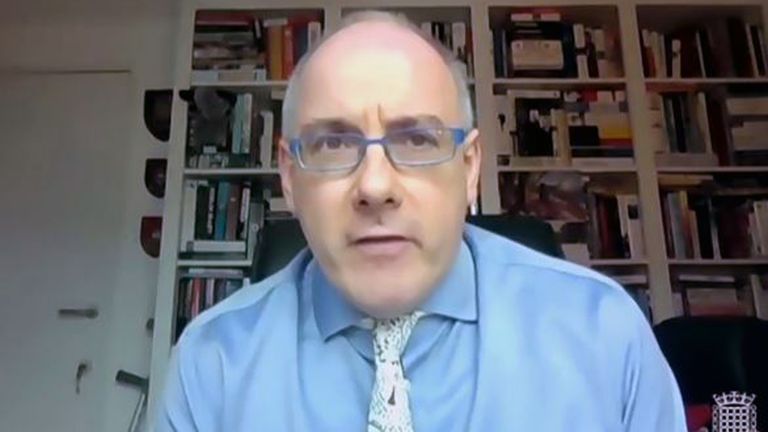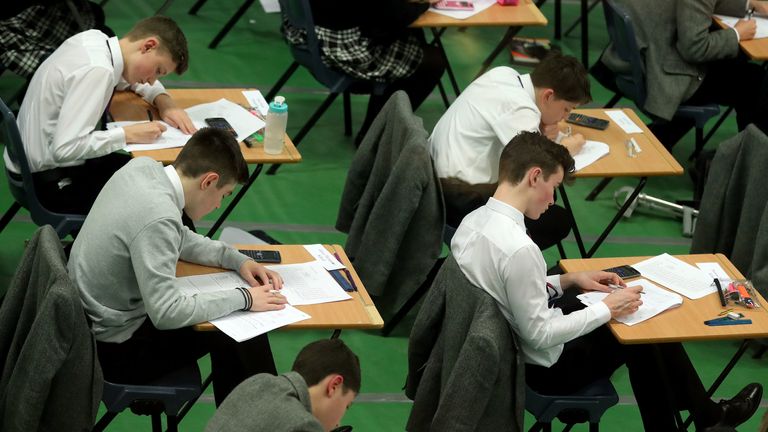Autumn Budget: Former Tory education secretary urges chancellor to lower earning threshold for student loan repayments
A former Conservative education secretary wants Rishi Sunak to push ahead with proposals to lower the earning threshold for student loan repayments, despite opposition from other senior figures in the party.
The government is considering recommendations set out in the 2019 Augar review, which said deductions for student loan repayments should be applied once an individual earns £23,000 rather than the current rate of £27,295.
Lord Baker of Dorking, who served as education secretary under Margaret Thatcher, told Sky News he “strongly” supports the proposed reduction.
“Would-be students should realise the obligation they will be taking on,” Lord Baker said.
The Augar review said the current earning threshold meant too many people with student loans were not required to make repayments, creating considerable cost for taxpayers. It recommended the threshold be brought in line with the median earnings for non-graduates.
But Justine Greening, another former Conservative education secretary, told Sky News introducing such a policy would entrench the equality gaps in education “even further”.
Ms Greening, who stood down as an MP in 2019, said such a change could result in students from poorer backgrounds viewing university as unaffordable.
“Levelling up is obviously about removing barriers to higher education rather than putting them up, and the big risk with this potential change that is being reported is that, actually, rather than closing equality gaps in education, it entrenches them even further,” Ms Greening said.
“And it means potentially fewer students from poorer backgrounds feeling like it is affordable to go to university.”
The former MP for Putney added that lowering the student loan repayment threshold would be a “very regressive” move that “directly hits the lowest earning graduates the hardest”.
Urging the government to look instead at a “graduate contribution scheme”, Ms Greening told Sky News: “My position is if the government feels that graduates should contribute more then, it should be making that change as one that is progressive and fairer – not hitting graduates on the lower-earning careers after universities the hardest.”
The former education secretary also said maintenance grants – scrapped in the 2015 budget – should be re-introduced, adding: “It is one of the reasons why students from the poorest families come out with the biggest debt and if we want to see levelling up happen in Britain that patently is an unfairness that needs to be tackled.”
Senior Conservative MP Robert Halfon, who chairs the Commons Education Select Committee, warned that “the cart is being put before the horse” and that the government should ensure universities provide value for money for undergraduates through a “new student guarantee” before considering lowering the repayment threshold.
“We need to move to a graduate tax and lower the interest rates to make it fairer,” the MP for Harlow added.
“To me the system is wrong and needs fundamental reform – and the fairest way to achieve this is through a graduate tax which is progressive.”
At present, English and Welsh undergraduates who started university in or after 2012 are on what are referred to as “plan 2 loans” and repay 9% of everything they earn above £27,295 once they have finished university.
These individuals continue to repay this same 9% until the loan is repaid in full, or until 30 years from leaving university, after which point the remainder of the amount owed is written off.
Universities in England can charge up to £9,250 a year while those in Wales can be charged £9,000. Scottish students do not have to pay to study in universities in Scotland.
The amount an individual pays back depends on how much they earn and is deducted directly from their pay packet – but graduates also pay back interest on their loans.
The interest rate changes every September and is based on the Retail Price Index (RPI) rate of inflation in the year to the previous March.
The RPI inflation rate was 1.5% in March 2021 and interest is currently charged at 1.5% to 4.2% on student loans, depending on how much someone earns.
If ministers do cut the earnings threshold at which graduates have to start repaying loans to £23,000 in this month’s Budget and repayments continue to remain at 9% of earnings – it would mean students earning an annual salary of £30,000 would pay around £400 more per year.
It is estimated lowering the threshold would save the government around £2bn, but it is not known whether the proposals could include applying this change retrospectively to graduates who have completed their degrees and are already paying back their loans.
The Augar review also recommended graduates should have to repay their student loans back over 40 years rather than the current 30 – it is not known whether this is also being considered by the government.
An Institute for Fiscal Studies (IFS) report issued in September warned that lowering the repayment threshold for student loans would hit graduates with average earnings the hardest.
Ben Waltmann, senior research economist at the IFS, told Sky News the policy would be “effectively a tax rise on middle earning graduates” and would place a “substantial burden” on some students.
“Under this policy, a graduate earning £30,000 per year would have to pay around £400 more per year,” Mr Waltmann said.
He noted that the sum would come on top of the recently announced 2.5% increase in National Insurance contributions under the government’s plans for health and social care – with employees and businesses both being subjected to a 1.25% rise.
Mr Waltmann said the proposal could impact “young graduates with middling earnings who may be saving for a deposit or trying to start a family” and that there are “other ways” that revenue could be raised.
He added that he could not rule out the possibility that lowering the threshold for loan repayments could reduce the number of students applying for courses in the 2022/23 academic year – but that the effect on overall student numbers would likely be small.
University and College Union general secretary Jo Grady told Sky News the move would be “regressive” and agreed it could deter less privileged students from going to university.
“Lowering the threshold at which graduates pay back student loans is a regressive move that risks putting less privileged students off from entering higher education,” she said.
“Instead of burdening lower-paid graduates with significant debt, the chancellor should be looking at secure public funding that ensures both further and higher education are fully accessible to all.”
She added: “The COVID pandemic has laid bare the flaws of a university system based on competition, markets and debt, with many institutions prioritising fees over health and safety. If the government really wants to ‘level up’ the country it must ensure decisions about which type of education to pursue aren’t based on fear of debt.”
And NUS vice president for higher education Hillary Gyebi-Ababio said: “We would be totally opposed to any plans on reducing the salary repayment threshold for student loans.
“Like the government’s decision to increase National Insurance contributions, this burden targets people earning lower incomes – after eighteen months of such hardship, and with the looming hike in energy prices set to hit millions of the most vulnerable this winter, the injustice is simply astounding.”
Posting on social media, Labour’s universities minister Matt Western said the move would constitute “widening the gap” between wealthy students and those less fortunate with “those on [the] lowest and middle incomes ultimately paying c.£10,000 more”.
But Nick Hillman, director of the think tank the Higher Education Policy Institute, told Sky News that if the Treasury is keen to cut spending, this idea is a “much better way to do it than most of the alternatives”.
“We have said very clearly that education spending should not be cut at a time of crisis,” Mr Hillman said.
“But if the Treasury are determined to reduce spending, given the country’s poor financial position, then this is a much better way to do it than most of the alternatives – like cutting student places, which would be terrible for young people, universities and the country.”
A Department for Education spokesperson told Sky News the student loan system was designed to ensure all those with the talent and desire to attend higher education were able to do so, while ensuring the cost was fairly distributed between graduates and the taxpayer.
“We continue to consider the recommendations made by the Augar panel carefully alongside driving up quality of standards and educational excellence and ensuring a sustainable and flexible student finance system,” the spokesperson said.
Source: Read Full Article








